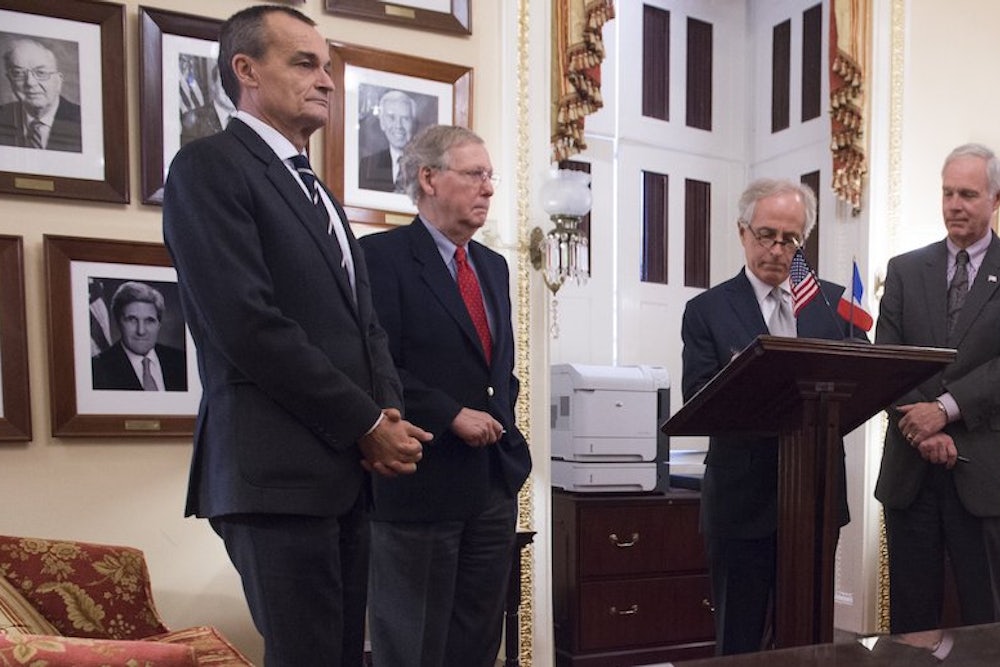Over the past four years, Republicans have habituated themselves to demanding unilateral concessions from Democrats by threatening to inflict various kinds of damage on the country every few months. After a couple of early defeats, Democrats caught on to the emptiness of these threats, and the practice turned into a mostly harmless ritual, punctuated only once in 2013 when Democrats refused to gut the Affordable Care Act and Republicans shut down the government.
With that historical pattern in mind, it should stand to reason that Republicans will soon cave and agree to fund the Department of Homeland Security unconditionally for the next several months. For the most part, I think this is a safe bet. But the origins of Republicans' threat to shut down DHS are different than the origins of previous threats—and they increase the likelihood that Republicans will allow department financing to lapse without a strategy in place to restore it.
Unlike earlier hostage dramas, the DHS shutdown threat emerged as a form of deescalation. Back in December, many conservatives wanted Republican leaders to threaten a complete government shutdown unless President Obama agreed to dismantle his own deferred action programs for upstanding unauthorized immigrants. Republicans cobbled together the DHS shutdown plan in haste, to ward off a more damaging confrontation, but from the outset it was clear they hadn’t thought things through much further than that. Setting up this fight allowed them to avoid a total government shutdown, but it only worked because they sold it to those conservatives as a fight they could win.
Two months later, Democrats predictably filibustered a GOP bill to fund DHS and end the deportation programs, and GOP leaders are just as predictably hard-pressed to declare defeat and move on to the next thing. They promised victory, but they’ve only just joined the battle.
This explains why Senate Majority Leader Mitch McConnell is planning to replay Tuesday’s vote at least one more time before DHS funding lapses at the end of February. Perhaps another failed demonstration will be enough to convince his hardline faction that President Obama has the upper hand.
But there’s something unique and confounding about the very premise of using DHS funding as a bargaining chip, and it scrambles the customary pattern. As I noted when the GOP strategy first took shape, threatening to shut down DHS is that rarest and most useless kind of threat—one that sounds implausibly terrible but is ultimately mild in its details. Unpleasant. Irresponsible. Spiteful. But mild. Like a cranky toddler threatening to scream until he gets dessert.
Unlike other GOP threats, this one isn’t an unsupportably dangerous, but canny bluff. To many casual spectators, threatening not to increase the debt limit sounded meaningless, or perhaps even like a good idea, when in fact the consequences of a collision with the debt limit would have been catastrophic. Threatening to shutdown the Department of Homeland Security, by contrast, sounds incredibly reckless, but has little weight behind it. As a national security bureaucracy, nearly all of DHS’ functions and employees are exempt from the shutdown protocols that delay Social Security checks and require national parks to close.
It’s the easiest threat in the world for Democrats to demagogue but one that Republicans can make without courting genuine devastation, and many of them are thus catching on to the possibility that the political damage wouldn’t stick. Ron Johnson, the Wisconsin Republican who heads the Senate Homeland Security committee is prepared to see the fight through past the deadline, precisely because “only 13.6 percent of DHS employees were furloughed” in the last shutdown. “[T]he national security aspects, the aspects of the department that keeps America safe, are continuing to function no matter what happens in this very dysfunctional place.”
(Johnson’s appetite for confrontation isn’t connected to the stakes of the fight. In October 2013, he described the possibility of a collision with the debt limit as “no cause for concern.” Back then he was wrong. Today he has a decent point.)
So the question for Republicans is whether they would rather sustain an uncertain degree of political damage, or surrender outright and confirm the right’s suspicions that they never intended to fight in the first place. Obama’s deferred action policies will continue largely unhindered either way. But there’s an uncomfortably plausible argument, for any Republican who’s open to convincing, that the political damage they’d suffer would reverse itself as time passed and the public noticed that basically nothing had changed. And it’s therefore alarmingly easy to imagine Republicans deciding that a DHS funding lapse—along with all the unforeseen consequences and predictable annoyances it would entail—is their least bad option.
